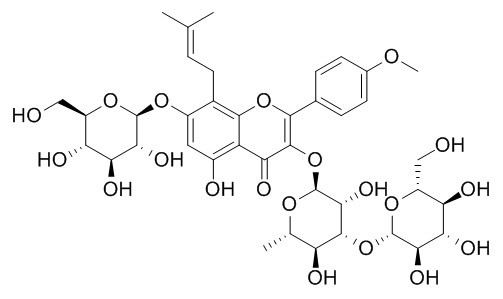Epimedin A1
Epimedin A has anti-osteoporosis activity.
Inquire / Order:
manager@chemfaces.com
Technical Inquiries:
service@chemfaces.com
Tel:
+86-27-84237783
Fax:
+86-27-84254680
Address:
1 Building, No. 83, CheCheng Rd., Wuhan Economic and Technological Development Zone, Wuhan, Hubei 430056, PRC
Providing storage is as stated on the product vial and the vial is kept tightly sealed, the product can be stored for up to
24 months(2-8C).
Wherever possible, you should prepare and use solutions on the same day. However, if you need to make up stock solutions in advance, we recommend that you store the solution as aliquots in tightly sealed vials at -20C. Generally, these will be useable for up to two weeks. Before use, and prior to opening the vial we recommend that you allow your product to equilibrate to room temperature for at least 1 hour.
Need more advice on solubility, usage and handling? Please email to: service@chemfaces.com
The packaging of the product may have turned upside down during transportation, resulting in the natural compounds adhering to the neck or cap of the vial. take the vial out of its packaging and gently shake to let the compounds fall to the bottom of the vial. for liquid products, centrifuge at 200-500 RPM to gather the liquid at the bottom of the vial. try to avoid loss or contamination during handling.
Biomimetics (Basel).2022, 7(4):154.
Asian J Beauty Cosmetol2022, 20(2):183-191
J Nat Prod.2022, 85(5):1351-1362.
Pharmacognosy Magazine2017, 13(52):868-874
EXCLI J.2023, 22:482-498.
Agronomy2023, 13(9), 2410.
Toxicol Rep.2021, 8:1131-1142.
Pharm Biol.2016, 54(7):1255-62
Sci Rep.2024, 14(1):26330.
Evid Based Complement Alternat Med.2022, 2022:1307173.
Related and Featured Products
Drug Metab Dispos,2015,43:1590–1600.
Intestinal Absorption and Metabolism of Epimedium Flavonoids in osteoporosis rats. [Reference:
WebLink]
Herba Epimdii is a traditional Chinese medicine used to treat
osteoporosis. Its main pharmacological ingredients are flavonoids.
In previous studies conducted in healthy animals, we showed that
epimedium flavonoids could be hydrolyzed into secondary glycosides or aglycon by intestinal flora or enzymes, thereby enhancing
their absorption and antiosteoporosis activity.
To study the medicine in the pathologic state, epimedium flavonoids were
incubated with intestinal mucosa and feces in vitro and intestinal
perfusion in situ to explore the differences in absorption and
metabolism between sham and osteoporosis rats.
METHODS AND RESULTS:
For osteoporosis
rats, the hydrolysis rates of icariin, epimedin A(Epimedin A1), epimedin B, and
epimedin C incubated with intestinal flora for 1 hour were reduced
by 0.19, 0.26, 0.19, and 0.14, respectively, compared with that in sham
rats. Hydrolysis rates were reduced by 0.21, 0.24, 0.08, and 0.31
for icariin, epimedin A, epimedin B, and epimedin C incubated
with duodenal enzymes for 1 hour and by 0.13, 0.09, 0.07, and 0.47
for icariin, epimedin A, epimedin B, and epimedin C incubated with
jejunum enzymes, respectively, compared with the sham group. In
addition, the apparent permeability coefficient and elimination
percentage of the four epimedium flavonoids in the duodenum,
jejunum, ileum, and colon decreased by 29%–44%, 32%–50%,
40%–56%, and 27%–53% compared with that in sham rats,
respectively. The main metabolites of the four epimedium flavonoids were the same for the two groups after intestinal perfusion,
or flora and enzyme incubation.
CONCLUSIONS:
In conclusion, the amount and
activity of intestinal flora and enzymes changed in ovariectomized
rats, which affected the intestinal absorption and hydrolysis of
epimedium flavonoids whose structures contain 7-glucose.
Spectrochimica Acta Part A Molecular & Biomolecular Spectroscopy, 2016, 171:351-360.
Rapid measurement of epimedin A, epimedin B, epimedin C, icariin, and moisture in Herba Epimedii using near infrared spectroscopy.[Reference:
WebLink]
METHODS AND RESULTS:
In this work, near infrared (NIR) spectroscopy was used in combination with chemometrics to determine the epimedin A(Epimedin A1
), epimedin B, epimedin C, icariin, and moisture contents of Herba Epimedii. The variable selection method genetic algorithm (GA) and regression tool support vector machine (SVM) were used to improve the model performance. Four different calibration models, namely Full-PLS, GA-PLS, Full-SVM, and GA-SVM, were established, and their performances in terms of prediction accuracy and model robustness were systemically studied and compared. In conclusion, the performances of the models based on the efficient variables selected through GA were better than those based on full spectra, and the nonlinear models were superior over the linear models. In addition, the GA-SVM model demonstrated the optimal performance in predicting five quality parameters (viz. epimedin A, epimedin B, epimedin C, icariin, and moisture). For GA-SVM, the determination coefficient (Rp2), root-mean-square error (RMSEP), and residual predictive deviation (RPD) for the prediction set were 0.9015, 0.0268%, and 2.20 for epimedin A; 0.9089, 0.0656%, and 3.08 for epimedin B; 0.9056, 0.1787%, and 3.18 for epimedin C; 0.8192, 0.0657%, and 2.26 for icariin; and 0.9367, 0.2062%, and 4.12 for moisture, correspondingly.
CONCLUSIONS:
Results indicated that NIR spectroscopy coupled with GA-SVM calibration can be used as a reliable alternative strategy to measure the epimedin A, epimedin B, epimedin C, icariin, and moisture contents of Herba Epimedii because this technique is fast, economic, and nondestructive compared with traditional chemical methods.



